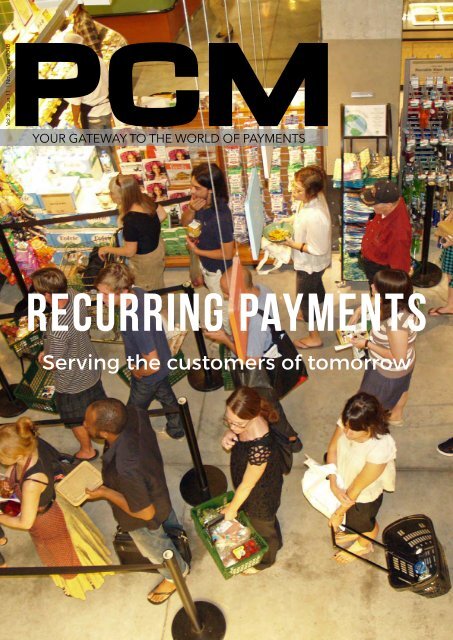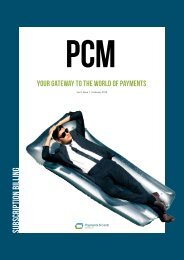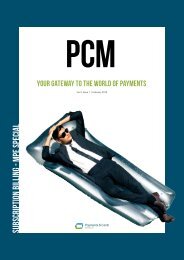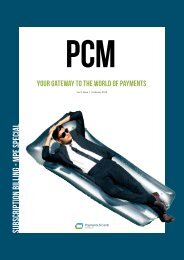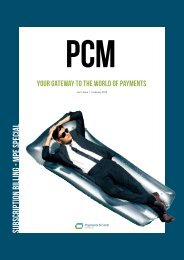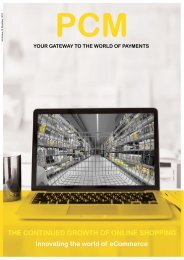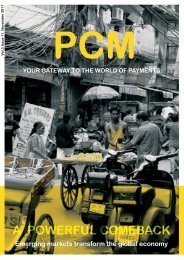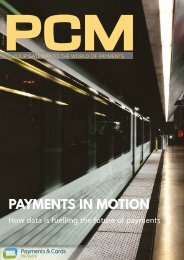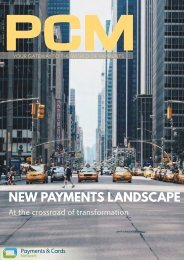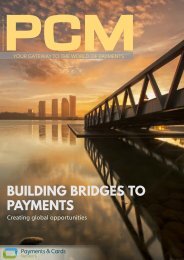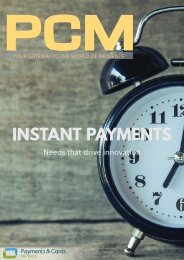PCM Vol. 2 - Issue 11
In a world where goods and services are increasingly purchased online, businesses have to find ways to ensure seamless online shopping experiences. Due to this trend offering Recurring Payments and subscription payment options have become a necessary change. Get more insight inside the eMag!
In a world where goods and services are increasingly purchased online, businesses have to find ways to ensure seamless online shopping experiences. Due to this trend offering Recurring Payments and subscription payment options have become a necessary change. Get more insight inside the eMag!
You also want an ePaper? Increase the reach of your titles
YUMPU automatically turns print PDFs into web optimized ePapers that Google loves.
<strong>Vol</strong> 2. <strong>Issue</strong> <strong>11</strong> | November 2016<br />
<strong>PCM</strong><br />
YOUR GATEWAY TO THE WORLD OF PAYMENTS<br />
recurring payments<br />
Serving the customers of tomorrow
Welcome to <strong>Vol</strong>.2 - issue <strong>11</strong><br />
In a world where goods and services are increasingly purchased online,<br />
businesses have to find ways to ensure seamless online shopping experiences.<br />
Due to this trend offering recurring payments and subscription payment<br />
options have become a necessary change. Aung Kyaw Moe, Founder & CEO @<br />
2C2P provides deep insight into recurring payments and shares best practices<br />
to manage these processes.<br />
Carrying on, Daniel Kornitzer, Chief Product Officer @Paysafe Group asks the ever lasting question,<br />
“Is your company prepared to fight online fraud?”. Daniel presents areas of improvements with<br />
relevant real life examples.<br />
Markus Rinderer, Senior Vice President @ACI Worldwide, elaborates on the most sought after solutions<br />
by merchants nowadays. With the rise of smart devices and connectivity, payment integrations and<br />
enablement is the way to go.<br />
Sunil Dixit, Principle Product Manager @Vantiv, shows us how important customer retention is within<br />
recurring payments as well as key challenges businesses have to face in the European market in<br />
that domain.<br />
For our startup Spotlight this month we interviewed Tim Chen, Co-Founder & CEO @Nerd Wallet. “We<br />
will continue to empower consumers and provide clarity on complicated financial decisions to help<br />
them change the way they think about their finances”.<br />
Finally, an overview of the hottest job openings we have at the moment. Feel like you need a change<br />
or looking for a job opportunity? Get in touch directly by clicking on the job. What better way to<br />
network and get to know your peers in the industry? Check out our premium event partners and make<br />
use of the discounts we have on offer before they run out!<br />
For any questions, suggestions, or concerns, please address them to the editors:<br />
Amir Abdin - amir@paymentsandcardsnetwork.com<br />
Duc Dang - duc@paymentsandcardsnetwork.com<br />
The Payments & Cards Network team wishes you good reading!<br />
Thanks to our partners<br />
002
Contents<br />
thoughtleaders<br />
spotlight<br />
4<br />
21<br />
8<br />
STORIES<br />
16<br />
4<br />
8<br />
Fraud, Friction, Risk & Rewards<br />
Daniel Kornitzer, EVP and Chief Product Officer @Paysafe,<br />
provides insight into key fraud trends in the eCommerce space.<br />
Payment integration and enablement is<br />
the cornerstone of a successful mobile<br />
strategy<br />
Markus Rinderer, SVP @ ACI Worldwide, indicates the essential<br />
aspects to serve the rapidly growing mobile eCommerce<br />
channel.<br />
21<br />
24<br />
Spotlight: NerdWallet<br />
Tim Chen, CEO & co-founder: “We take pride in helping<br />
consumers make informed financial decisions based on the<br />
expert, honest advice and objective information we provide.”.<br />
Hot Jobs<br />
Hand picked jobs of the month within the Payments and<br />
FinTech industry. Check out our hottest vacancies for this<br />
month and hit APPLY!<br />
<strong>11</strong><br />
Recurring Payments: the Fast Food of<br />
eCommerce<br />
Sunil Dixit, Principle Product Manager @ Vantiv presents key<br />
insights into recurring eCommerce business models & advises<br />
on how to mitigate risks in that field.<br />
25<br />
Events<br />
Stay up to date with the latest happenings in the<br />
industry and make use of our special promo codes!<br />
16<br />
Recurring payments<br />
Aung Kyaw Moe, Founder & CEO at 2C2P explores the benefits<br />
and challenges of recurring payments.<br />
003
Thought Leaders Corner<br />
Fraud, Friction, Risk & Reward<br />
Is your company prepared to fight<br />
online fraud?<br />
by Daniel Kornitzer<br />
We live in fascinating times. As a technologist<br />
at heart, I’m thrilled by the advances in big<br />
data, real-time streaming, correlation, virtual<br />
cubes and the like, and by the incredible<br />
promise of supercomputers and quantum computing.<br />
These technologies are creating value for individuals and<br />
communities around the world. For example, when quantum<br />
computing becomes commercially available, in the next five<br />
to 10 years, it will bring tremendous opportunities for science<br />
and medicine.<br />
The threats in digital<br />
payments today...<br />
But every rose has its thorn … as quantum computing will also<br />
make it easy for criminals to break public key cryptography,<br />
which is at the base of today’s online and mobile commerce.<br />
The problem is that the same advances available to companies<br />
and authorities are also available to organisations with<br />
unsavoury goals. Risk in digital payments is no longer only the<br />
work of isolated, malicious hackers in their basement, seeking<br />
to impress their friends, but of criminal organisations with<br />
access to a wealth of technical resources, such as organised<br />
crime, cause-motivated hacktivists and rogue nations.<br />
004
Thought Leaders Corner<br />
Daniel Kornitzer<br />
EVP - Chief Product Officer<br />
Daniel Kornitzer serves as EVP and Chief Product Officer<br />
of Paysafe Group PLC. Prior to re-joining the Group in<br />
2014, he was CEO and Board Member of SiteSell.com.<br />
In his 20+ years in technology management, Daniel<br />
has pioneered groundbreaking initiatives, from one<br />
of the world’s first over-the-phone speech recognition<br />
systems and the ISO/ITU standards for video coding<br />
in use today, to FirePay’s digital wallet and industryleading<br />
risk management processes, which resulted in<br />
his subsequent appointment as a member of the NACHA<br />
Risk Management Task Force. Daniel holds a B.Eng<br />
in electrical engineering from Ecole Polytechnique of<br />
Montreal, M. Eng from McGill University and a diploma in<br />
network engineering from University of Toronto.<br />
These criminals can often correlate data from different<br />
breaches to either use (or sell in the dark web) stolen sensitive<br />
personal information that can lead to all sorts of fraud,<br />
identity theft, account takeovers, and more.<br />
Compounding the problem is the ubiquity of digital<br />
payments. E-commerce is approaching $ 2 trillion globally,<br />
and the explosion of mobile, with currently almost five billion<br />
connected devices, which are predicted to reach anywhere<br />
between 25 and 50 billion by 2020, powered by the growth<br />
of the Internet of Things that will allow our fridges to order<br />
milk and our dishwashers to order soap when they’re about<br />
to run out, obeying “intelligent contracts”, which are a sort<br />
of standing orders establishing the triggers and boundaries<br />
of these automated transactions.<br />
At Paysafe, being a pioneer of e-commerce since its inception<br />
in the late ‘90s, we have seen virtually all favours of risk and<br />
fraud, and have developed a unique expertise, that combines:<br />
knowledge, processes and proprietary tools, as well as the<br />
integration of leading third-party security tools and industry<br />
best practices, as recommended by the card schemes.<br />
The conundrum of risk management boils down to two<br />
seemingly conflicting goals: (a) consumer convenience; and<br />
(b) protection against fraud.<br />
Convenience, as consumers and merchants desire a<br />
frictionless environment … single tap, single click, rememberme<br />
features, etc. On the other hand, security needs continue<br />
to grow, with two-factor authentication, biometrics, etc.<br />
Now, a few interesting stats, which provide a sense of the<br />
backdrop against which businesses and consumers are<br />
operating:<br />
• Every single minute, over 600,000 phishing emails are<br />
sent;<br />
• Fraud is moving to card-not-present (CNP), due to<br />
securing of POS transactions with chip and PIN cards.<br />
CNP represented 59% of global fraud in 2015, up from<br />
52% in 20<strong>11</strong>;<br />
• The U.S. accounts for 61% of global fraud, likely as a result<br />
of the delayed rollout of chip and PIN cards. In contrast,<br />
Europe accounts for 18%.<br />
There are areas of improvement. For example, industry<br />
stats show that the median days before the discovery of a<br />
compromise was 146 days in 2015, down from a horrific 416<br />
days in 20<strong>11</strong> … but 146 days is still almost five months! And<br />
the worst part is that the compromise detection source is<br />
external in 53% of cases, versus internal in only 47%.<br />
The thing is … fraud has as many facets as there are flavours<br />
in a good Italian gelato shop. These are some that come to<br />
mind, in this in no way exhaustive list:<br />
• Account takeover / identity theft: fraudster impersonates<br />
the legitimate consumer and gains control of an existing<br />
account or creates a brand new fraudulent account;<br />
• Friendly fraud: the consumer, or a close family member,<br />
performs the transaction but then claims he/she did not;<br />
• Affiliate fraud: fraudulent transactions for the sole<br />
purpose of generating affiliate commissions. The<br />
commissions are paid, then the affiliate disappears<br />
before the transactions come back as chargebacks;<br />
• Re-shipping: the fraudsters get goods shipped to a<br />
legitimately looking address, only to have the goods<br />
forwarded to the ultimate destination;<br />
• Botnets: infected computers are used to initiate orders<br />
to take advantage of their “clean IP address”;<br />
• Phishing / whaling: emails that direct to a false webpage,<br />
005
Thought Leaders Corner<br />
aimed at collecting login credentials to defraud the<br />
unsuspecting consumer. Whaling involves spoofed emails<br />
that appear to come from people in position of authority<br />
within the company, like a CEO or CFO, asking for an<br />
immediate wire transfer;<br />
• Triangulation: the fraudster pretends to sell goods online,<br />
but for the only purpose of collecting credit card information<br />
and other personal details, which are then immediately used<br />
to perform fraudulent purchases at another site;<br />
And then we have “clean fraud” where the transaction provides<br />
absolutely no indication of anything improper, clearly the hardest<br />
to detect.<br />
What to do to keep fraudsters at bay?<br />
The key to mitigating e-commerce risk is relentless vigilance.<br />
Putting in place the tools that generate data, not a flood of<br />
useless reports which go mostly unread, but laser focused data<br />
(threat intelligence), which leads to analysis, and prompt action.<br />
There is no single answer or silver bullet to combat fraud.<br />
Instead, a multi-pronged approach has been proven to deliver<br />
excellent results, composed of the following elements:<br />
• Staff training;<br />
• Selecting the right processing partner;<br />
• Refining your own offering (privacy, refund policy, easy<br />
access to customer service);<br />
• Internal fraud prevention (access control, need to know<br />
basis);<br />
• Use of scheme tools (AVS, CVV2, 3DS);<br />
• Strict adherence to PCI DSS;<br />
• Use of fraud screening tools (device fingerprinting, IP<br />
geolocation);<br />
• Outsorting for manual review of certain transactions; and<br />
• Monitoring of chargebacks, but also total volume,<br />
refunds and declines, for any unexpected spikes or other<br />
inconsistencies.<br />
Being great about risk and fraud is not a nice to have. It’s not<br />
about becoming a bit more profitable. It’s a major competitive<br />
differentiator.<br />
Fraudsters are always looking for the path of least resistance. If<br />
your webshop is easier to defraud, you’ll be certain to attract an<br />
inordinate amount of fraud. Conversely, if you are better than<br />
your competition, you’ll effectively be “sending the fraud away”.<br />
So, in my opinion, the best approach is to take control and create<br />
a path that, without compromising convenience and ease of use,<br />
protects your business and your consumers. As my very first<br />
boss taught me years ago; there are three secrets to success:<br />
preparation, preparation and preparation. Risk management is<br />
no exception.<br />
Paysafe<br />
www.paysafe.com<br />
Paysafe Group PLC is a technology company that provides online and mobile payment services. Paysafe<br />
delivers end-to-end payment solutions - from card issuing to acquiring; from payment gateways to<br />
merchant accounts; from fraud and risk management to reporting and analytics; from digital wallets and<br />
online invoicing to mobile.<br />
006
The Merchant Risk Council<br />
Building Better Commerce<br />
WHY JOIN THE MRC?<br />
The MRC is more than just a fraud and payments trade association. The MRC is a community offering<br />
professionals valuable networking and information-sharing opportunities as well as resources critical<br />
to developmental growth. MRC members have access to:<br />
A comprehensive resource library<br />
of educational presentations,<br />
webinars, benchmarking reports,<br />
case studies<br />
Discounted registration to four<br />
annual conferences in the EU and US<br />
Member directory with<br />
connections to prominent<br />
business contacts<br />
Unlimited number of individuals<br />
who can participate<br />
Discussion forums, newsletters and<br />
marketing opportunities<br />
Regional networking events<br />
JOIN THE MRC NOW!<br />
Become part of a premier group of eCommerce professionals surpassing industry standards<br />
and transforming the fraud and payments landscape. MRC members have more industry<br />
opportunities, resources and connections allowing them greater success.<br />
MRC<br />
Building<br />
Better Commerce<br />
Fraud & Payments Professionals<br />
merchantriskcouncil.org
Thought Leaders Corner<br />
by Markus Rinderer<br />
Payment integration and enablement is the<br />
cornerstone of a successful mobile strategy<br />
In the majority of developed markets,<br />
store-based retail sales are shrinking<br />
while eCommerce and mCommerce<br />
grow at 10- 20% annually. It is no<br />
surprise then that merchants are more<br />
focused on digital commerce growth<br />
opportunities more than ever before.<br />
There are a number of different paths<br />
that a merchant can pursue to harness<br />
this digital commerce opportunity. From<br />
optimizing a domestic business, to going<br />
cross-border or enabling omni-channel;<br />
each growth path presents unique<br />
challenges from a payments perspective.<br />
While the specific challenges differ<br />
depending on the growth strategy, in<br />
all cases payments play a pivotal role<br />
in turning shoppers in buyers, and are<br />
integral to merchants’ bottom lines.<br />
Of all the ways that merchants can<br />
expand and grow their business, mobile<br />
is currently the priority for many, which<br />
is unsurprising given that nothing<br />
else today is driving more commerce<br />
growth. Although principles gleaned<br />
from traditional eCommerce extend<br />
to mobile commerce, merchants must<br />
adapt the customer experience and<br />
operating model in order to thrive. And<br />
that includes adapting their approach to<br />
payments.<br />
Consequently, merchants are<br />
demanding that their payment providers<br />
equip them with the integration tools,<br />
payment methods, and technical<br />
documentation needed to serve the<br />
mobile channel.<br />
The mobile opportunity for<br />
merchants<br />
There are now 8.6 billion mobile devices<br />
worldwide, which is 1.2 devices per<br />
person. And they are increasingly<br />
powerful devices: 2016’s iPhone is<br />
more powerful than 2006’s iMac, has<br />
similar screen resolution, and a much<br />
faster internet connection. Nearly 80%<br />
of mobile users in developed markets<br />
use a smartphone and analysts expect<br />
70% of the world’s population to have a<br />
smartphone by 2020.<br />
Consequently, mobile commerce is<br />
outgrowing traditional eCommerce,<br />
and has really exploded over the past<br />
five years. Notching only a single digit<br />
mCommerce as % of total e/mCommerce<br />
in key markets<br />
Source: Local e-Commerce Associations, eCommerce Europe,<br />
Internet Retailer, Mobile Marketer, First Annapolis market<br />
observations and estimates.<br />
008
Thought Leaders Corner<br />
contribution to overall eCommerce<br />
(desktop plus mobile commerce) in<br />
2010, mobile now accounts for more<br />
than 50% of eCommerce in the U.K. and<br />
China, 33% in the U.S., and over 20% in<br />
many other European markets. Mobile<br />
is likely to continue outgrowing desktopbased<br />
eCommerce into the future.<br />
Desktop versus mobile conversion rates<br />
There are similarities to desktop-based<br />
eCommerce, especially when conducted<br />
via a mobile web browser, but mobile’s<br />
unique form factor enables many other<br />
possibilities. Mobile wallets can enhance<br />
payment security by authenticating<br />
all transactions with a PIN or by<br />
leveraging biometric and other sensors.<br />
Mobile payments can also be more<br />
convenient by enabling contactless<br />
in-store payments or one-click online<br />
payments. Loyalty programs can be<br />
layered into transactions, receipts can<br />
be digitized, and mobile wallets will<br />
one day automatically select the most<br />
appropriate card for a given transaction.<br />
Mobile apps for retailers can enhance<br />
the shopping experience and improve<br />
conversion rates. And while these apps<br />
are usually not strictly payments tools,<br />
their viability often relies on embedded<br />
payments. Examples include mobile<br />
self-checkout so shoppers can avoid<br />
lines, or product review and price check<br />
services, which act as advertising tools.<br />
The importance of mobile<br />
eCommerce to a merchant is driven<br />
by a number of factors<br />
Sector: Certain sectors - including<br />
gaming, digital goods, and travel - are<br />
mobile by nature and tend to lead<br />
mCommerce adoption. Mainstream<br />
verticals like electronics, apparel, and<br />
general retail are now seeing higher<br />
acceptance driven by omni-channel<br />
initiatives.<br />
Purchase behavior: Merchants<br />
experiencing high frequency and low<br />
average transaction values tend to<br />
lead mobile payment. Classic examples<br />
include Starbucks, as well as European<br />
and Asian public transit systems.<br />
Source: First Annapolis Consulting<br />
Customer demographics: Merchants<br />
with young, urban, and tech-savvy<br />
customers have higher mobile service<br />
demand, as those individuals tend to be<br />
early adopters and find mobile shopping<br />
more convenient than desktop or<br />
laptop-based eCommerce.<br />
lead mobile payment. Classic examples<br />
include Starbucks, as well as European<br />
and Asian public transit systems.<br />
009
Thought Leaders Corner<br />
Smartphone penetration: Modern<br />
smartphones are dramatically more<br />
capable and user-friendly than their<br />
predecessors, fully enabling mobile<br />
commerce. In most European markets<br />
smartphone ownership is well over 50%<br />
and is 80% in the U.S. and 88% in South<br />
Korea. Mobile commerce still occurs in<br />
markets dominated by feature phones<br />
but is an SMS-centric experience<br />
enabled by closed-loop carrier-based<br />
mobile payment systems.<br />
Challenges and solutions when<br />
enabling the mobile channel<br />
Merchants must consider the unique<br />
challenges selling via mobile brings to<br />
the customer experience. Not only is the<br />
screen smaller, but hover-over design<br />
elements, pop-up windows, fixed-size<br />
iFrames, and other elements may not<br />
work well on mobile and can undermine<br />
checkout conversion. Shoppers are also<br />
more likely to be on the go or multitasking<br />
which means they are more<br />
distracted during the shopping and<br />
checkout process. All of this results<br />
in checkout completion rates that<br />
are about 40% lower on mobile than<br />
desktop.<br />
Mobile apps are one solution to combat<br />
the low conversion challenge. Apps<br />
allow merchants to design “pixel perfect”<br />
branded experiences and unlock<br />
unique capabilities such as device<br />
functions (e.g., camera or biometric<br />
scanner) and leverage mobile wallets<br />
like Apple Pay. However, apps have their<br />
own challenges, specifically, how do you<br />
incentivize consumers to download and<br />
habitually use it?<br />
Whether a mobile-optimized online<br />
shop or an app, strong design and a<br />
smooth checkout process are key to<br />
effective commerce. This importance is<br />
illustrated by the fact merchants often<br />
focus on payment methods that do<br />
not require external validation factors<br />
such as 3-D Secure. For example, many<br />
retailers enable PayPal for their mobile<br />
sites but exclude it on bigger screens for<br />
cost reasons.<br />
Mobile creates unique payments<br />
challenges simply because what works<br />
on a 15-inch computer monitor and<br />
keyboard rarely works well on a fourinch<br />
touchscreen. Pages displayed<br />
incorrectly on mobile, complicated<br />
payment forms, 3-D Secure redirects,<br />
and pop-ups all increase checkout<br />
abandonment. Mobile requires<br />
responsive payment pages and one-tap<br />
payment capabilities via saved payment<br />
profiles or digital wallets. Merchants<br />
should therefore extend smart<br />
checkout tools, such as card vaults, from<br />
the online environment onto mobile<br />
devices, as well as extending the base<br />
of payment methods to include relevant<br />
mobile wallets.<br />
Markus Rinderer<br />
SVP, ACI Worldwide<br />
Markus Rinderer serves as senior<br />
vice president at ACI Worldwide,<br />
driving the development of the<br />
company’s omni-channel merchant<br />
retail strategy. Previously, he served<br />
as CEO and founder of PAY.ON,<br />
a leader in eCommerce payment<br />
gateway services, which was<br />
Payment providers, as a result of<br />
these evolving needs, must adapt their<br />
offering to enable their merchant to fully<br />
take advantage of growth opportunities<br />
in the mobile channel.<br />
ACI Worldwide’s whitepaper, “Fast-track merchant growth paths in eCommerce,” discusses five key merchant growth paths, and<br />
is supplemented by use cases and best practices. It can be downloaded from www.aciworldwide.com/merchantgrowth.<br />
ACI Worldwide<br />
ACI Worldwide, the Universal Payments (UP) company, delivers real-time, any-to-any payments capabilities<br />
and enables the industry’s most complete omni-channel payments experience. ACI’s UP eCommerce<br />
Payments solution enables payment service providers, ISOs, acquirers, ISVs, VARs, and merchants to fully<br />
outsource payment transaction processing to a white label partner or integrate a gateway-to-gateway<br />
solution. Cross-border payment processing, PCI-compliant merchant boarding, real-time fraud prevention,<br />
and access to more than 350 card acquirers and alternative payment methods is made possible through a<br />
single integration to ACI’s SaaS-based open payment infrastructure. To learn more about ACI, please visit<br />
www.aciworldwide.com. You can also find us on Twitter @ACI_Worldwide.<br />
010
Thought Leaders Corner<br />
Recurring Payments: the Fast Food of eCommerce<br />
by Sunil Dixit<br />
Over two decades ago, I visited<br />
my first McDonald’s outside<br />
the U.S. while visiting Paris.<br />
McDonald’s in Paris was a<br />
revelation. The burgers were the same,<br />
the prices were the same, but the<br />
environment was spectacular. Vaulted<br />
ceilings! Red wine! Two floors and a<br />
gorgeous view! Service was fast and<br />
cheerful. The cashiers were not parttime<br />
high school kids paid minimum<br />
wage. Rather, they were well-trained,<br />
well-paid, and motivated. McDonald’s<br />
in France was better than its U.S.<br />
counterpart in every way. It was also<br />
local: beef and wine were locally sourced,<br />
measurements were metric, and menus<br />
were in both French and English.<br />
For fast food to launch in Europe, it<br />
had to be more than just convenient.<br />
Americans value convenience so highly<br />
they will accept a host of compromises<br />
in exchange for a small reduction in<br />
time. The rest of the world requires<br />
more. Like fast food, if merchants with<br />
recurring business models expect to<br />
succeed outside the U.S. they need to<br />
be more than convenient. They need to<br />
satisfy table stakes of the local market.<br />
They need to be crispy fries, low prices,<br />
and a beautiful view with a glass of wine.<br />
Supersize My Revenue: Recurring<br />
Payments in North America<br />
The key to a winning recurring<br />
eCommerce business is customer<br />
retention. If a business can provide<br />
strong evidence of long customer<br />
lifetimes, the market value of that<br />
business dramatically increases. To<br />
quote Jeff Bussgang, a noted ven-ture<br />
capitalist in Boston, “Recurring revenue<br />
is magic. Recurring revenue business<br />
models are not a little bit better than<br />
non-recurring models. They are 10x<br />
better.” 1<br />
Successful technology companies that<br />
used to be valued at 3x revenue are<br />
being purchased for 8-12x revenue.<br />
Subscription retailers jumping<br />
in with both feet are also being<br />
handsomely rewarded. For example,<br />
Dollarshaveclub.com, well-known for<br />
their hilarious viral video, 2 was picked<br />
up this year by Unilever for $1 billion,<br />
after reporting earnings of $150 million<br />
with a valuation of $615 million the year<br />
before. 3<br />
This boosted value isn’t totally insane<br />
if you understand negative churn.<br />
Negative churn happens when a<br />
business is not only replacing more<br />
customers than it is losing, but is also<br />
successfully upselling their existing<br />
customer base. Negative churn makes<br />
for exponential growth curves as seen<br />
below. Dollarshaveclub.com was very<br />
good at increasing average ticket by<br />
adding new products to each monthly<br />
order.<br />
To achieve growth like this, one has to<br />
control customer churn, ideally below<br />
2.5 percent. More than that, according to<br />
David Skok of Matrix Partners, “You are<br />
simply filling a leaky bucket, and will not<br />
be able to build a long term sustainable<br />
business.” 4 Early on, it’s easy to replace<br />
revenue if 5 percent of customers<br />
leave. Five percent of $100,000 is not<br />
an aggressive monthly sales target. But,<br />
if the business grows to $10 million per<br />
month, small increases in churn will be<br />
much more difficult to recoup every<br />
month.<br />
A solid understanding of churn and<br />
customer lifetime value is no longer<br />
a luxury for payments managers and<br />
engineers. Fintech tends to focus<br />
on removing barriers to payment<br />
acceptance, sizeable as they are. Viable<br />
recurring businesses, however, are<br />
intent on managing churn, and payments<br />
plays a big role here as well. Involuntary<br />
churn is what happens when a customer<br />
is lost due to a payment failure, even if<br />
that customer still wants the product.<br />
When millions of cards are being<br />
reissued – either due to data breaches,<br />
0<strong>11</strong>
Thought Leaders Corner<br />
the expansion of EMV-enabled cards,<br />
or brand swaps by card networks and<br />
issuing banks – involuntary churn can<br />
make revenue forecasting a guessing<br />
game. Even tiny increases in payment<br />
declines can result in a big earnings<br />
miss. The method of payment chosen<br />
by the buyer can impact lifetime value,<br />
too. On top of this, there is fraud and<br />
card testing to contend with. The good<br />
news for payments professionals is<br />
tiny increases of even five basis points<br />
to approval rates can net major gains in<br />
business value.<br />
Burger, Fries, and a Coke of Recurring<br />
Payments<br />
Over the last five years, a standard menu<br />
of best practices for preserving high<br />
lifetime value has emerged. Prior to the<br />
sale, effective management of account<br />
updating, prepaid card acceptance, and<br />
fraud are important. After the initial sale,<br />
merchants should achieve high levels<br />
of customer engagement and effective<br />
decline recycling.<br />
Account updater technology is<br />
the only silver bullet for improving<br />
Source: http://www.forentrepreneurs.com/why-churn-is-critical-in-saas/<br />
Ex. Sales Manager Payments, Business Development Manager<br />
SIGN UP NOW!<br />
JOIN OUR JOB BOARD & SHAPE THE FUTURE OF PAYMENTS<br />
Please contact: amir@paymentsandcardsnetwork.com or visit www.payment.jobs<br />
Payments & Cards Network | Herengracht 576 | 1017 CJ | Amsterdam | The Netherlands | +31 203 030 257
Thought Leaders Corner<br />
Source: Vantiv Account Updater response data, October 2014 - September 2016<br />
recurring payment approval rates. Visa,<br />
MasterCard, Discover, and American<br />
Express all have their own version of<br />
account updater and, aside from AMEX,<br />
they all work similarly: submit an account<br />
number and the network will return<br />
a response indicating if the account<br />
number or expiration date has changed,<br />
the account has been closed, or the<br />
merchant should contact the customer<br />
for new information (American Express<br />
pushes account updates to merchants,<br />
who must register acquired accounts<br />
directly with the network).<br />
Due to data breaches, brand swaps, and<br />
EMV the volume of account updates in<br />
the U.S. and Canada has tripled since<br />
2012. Vantiv makes over 4 million<br />
account update requests – per day – on<br />
behalf of its merchants, and over the last<br />
two years a steady 6 percent of requests<br />
return a response indicating an account<br />
change. Merchants not using this service<br />
risk losing this 6 percent of their billing<br />
cycle to involuntary churn. Some of this<br />
revenue is recoverable, but not without<br />
costly outreach to customers, which can<br />
take months and is not always effective.<br />
As a result, account updating is no<br />
longer a nice-to-have option, it is a<br />
strategic imperative.<br />
I’m Not Here To Eat<br />
Identifying customers that are abusing<br />
Identifying customers that are abusing<br />
trial offers or, worse, committing fraud<br />
is a vital part of developing a profitable<br />
customer base. When acquiring a new<br />
customer, open loop, non-reloadable<br />
prepaid cards are a poor fit for a<br />
recurring revenue business. While<br />
the first transaction may approve,<br />
subsequent transactions will have a<br />
much lower approval rate. Vantiv’s data<br />
indicates a non-reloadable prepaid card<br />
will approve for 1.2 payment events<br />
on average. The reason for such a low<br />
success rate is that the cards cannot be<br />
over-drafted (like a debit card), and don’t<br />
have adjustable credit limits (like credit<br />
cards). If the recurring payment is just<br />
$.01 more than the available balance on<br />
the card, the payment will fail. There are<br />
a few options for controlling payments<br />
with these cards: require customers to<br />
supply a backup method of payment,<br />
have your acquirer or gateway filter<br />
the cards prior to authorization, or use<br />
a “Recurring” or “Installment Order”<br />
indicator for the initial payment. Over<br />
90 percent of issuers will decline a nonreloadable<br />
prepaid card transaction<br />
with a Recurring Indicator, even if there<br />
is sufficient balance on the card.<br />
Outside of card testing, fraud presents<br />
less of a risk to recurring revenue<br />
businesses than pure internet retailers.<br />
Still, card testing can drive up processing<br />
costs and fool companies into thinking<br />
they are acquiring bad customers. A<br />
fraud solution that identifies device,<br />
IP address and geolocation, and can<br />
pierce web proxies will provide the data<br />
necessary to erect payment velocity<br />
controls. 5 The 3- or 4-digit card security<br />
code helps to ensure the customer has<br />
the card in hand, rather than a white<br />
plastic copy. Address verification service<br />
(AVS) can be helpful, but it introduces<br />
a potential obstacle to conversion.<br />
Consider carefully, if you aren’t shipping<br />
a physical good, how much address<br />
information you really need for a<br />
conversion.<br />
Please Come Again<br />
After the first payment, ensuring<br />
successful future payments requires<br />
a strategy for managing failed<br />
authorizations. When involuntary churn<br />
rears its ugly head, retry the decline<br />
(also called “authorization recycling”).<br />
If the decline is a soft decline, such<br />
as “Insufficient Funds” or “Do Not<br />
Honor,” merchants may retry up to<br />
four times over sixteen days for Visa,<br />
and even longer for other card types.<br />
Hard declines may be recycled as well,<br />
but only if the merchant receives an<br />
account update with new payment card<br />
information. This is why requesting<br />
an account update prior to the next<br />
billing event is insufficient. To maximize<br />
the benefit of account updater, keep<br />
making requests after each recycling<br />
attempt! The USAA debit brand swap<br />
from MasterCard to Visa this summer<br />
involved daily cohorts of tens of<br />
thousands of cards issued every day.<br />
Merchants that failed to request often<br />
enough risked missing these updates.<br />
On a related note, merchants can and<br />
should send all Visa update requests to<br />
MasterCard and vice-versa. With such<br />
brand swaps, this is the only way to<br />
receive the new account numbers.<br />
Note that authorization recycling may<br />
have regional rules. For example, as<br />
of October 2016, Visa Europe will be<br />
applying a EUR 1.00 fee for the fourth<br />
and subsequent recycle attempts for<br />
R1 (Revocation of Authorization Order)<br />
or R3 (Revocation of All Authorizations<br />
013
Thought Leaders Corner<br />
Order) decline codes. 6 Such fees should<br />
inform business cases for changes in<br />
recycling logic.<br />
Imagine a Beautiful View with a Glass<br />
of Wine<br />
Recurring payment business models are<br />
just getting started in Europe. Long the<br />
domain of utilities and mobile carriers,<br />
Software-as-a-Service (SaaS) companies<br />
are proliferating in the UK and France.<br />
Accel partner Philippe Botteri notes<br />
that five of Accel’s 10 most recent<br />
investments in Europe have been SaaS<br />
companies. 7 Most of these companies<br />
are not yet mature, however, and<br />
are not as sensitive to churn as their<br />
longer-running American counterparts.<br />
This is fortunate, as technology such<br />
as account updating has less coverage<br />
across Europe compared with the<br />
U.S., with participation mandated by<br />
Visa only in the U.K., Ireland, Italy, and<br />
Greece, with weaker issuer participation<br />
in France, and totally absent elsewhere. 8<br />
8 While cards are king in North America,<br />
recurring payments in Europe will<br />
require a more sophisticated, localized<br />
approach.<br />
Does a merchant’s German customer<br />
prefer to pay by invoice or SEPA?<br />
Do Dutch customers prefer Ideal or<br />
GiroPay? Will PayPal be top of wallet or<br />
is Amazon Payments a more trusted<br />
partner? Would customers perceive<br />
that a service like Klarna removes<br />
friction from a recurring payment? Each<br />
of these options handles recurring<br />
payments differently, and all have<br />
different rules for resolution of failed<br />
payments. Merchants should resist<br />
the urge to accept every method of<br />
payment and instead use A/B testing to<br />
determine the methods of payment with<br />
the highest likelihood of conversion for<br />
both initial and subsequent payments.<br />
Compounding complexity are the<br />
proposed PSD2 regulations, some of<br />
which have already taken effect as of<br />
December 2015. 9 Choice of third-party<br />
providers (TPPs) will be vital to sustaining<br />
payments, as they will have full control<br />
over customer authorization. Strong<br />
Customer Authentication (SCA) will<br />
further raise barriers to entry, and could<br />
possibly upset currently functioning<br />
Risk-Based Authentication (RBA). One<br />
way to avoid the restrictions may be to<br />
keep authorization amounts below EUR<br />
10.00, or to encourage customers to<br />
use direct debit, which are not covered<br />
by SCA. 10 However this is not yet settled<br />
law, not all merchants can sell their<br />
services so cheaply, and involuntary<br />
churn for direct debit could be higher<br />
than with debit cards. Clearly, there are<br />
no easy answers ahead for recurring<br />
payments in Europe.<br />
Same Taste, Better Experience<br />
Despite increased complexity from local<br />
payment preferences and regulatory<br />
hurdles, recurring revenue business<br />
models in Europe have the opportunity<br />
to improve upon the American<br />
consumer experience. Merchants and<br />
payment service providers that use<br />
a data-driven approach to present<br />
customers with their preferred method<br />
of payment, and have supporting<br />
strategies to handle involuntary churn,<br />
will avoid early missteps and enjoy a<br />
tremendous competitive advantage.<br />
competitive advantage.<br />
1 http://www.inc.com/jeff-bussgang/recurring-revenue-is-magic.html<br />
2 https://www.youtube.com/watch?v=ZUG9qYTJMsI<br />
3 http://blogs.wsj.com/digits/2015/06/21/dollar-shave-club-valued-at-615-million<br />
4 http://www.forentrepreneurs.com/why-churn-is-critical-in-saas/<br />
5 https://www.vantiv.com/vantage-point/safer-payments/stop-credit-card-fraud-online<br />
6 https://www.adyen.com/fr_FR/blog/visa-updates-august-2016<br />
7 http://tech.eu/features/<strong>11</strong>306/saas-wars-europe-awakens/<br />
8 https://www.visaeurope.com/media/images/recurring%20transactions%20best%20practice%20<br />
9 http://www.mastercardadvisors.com/_assets/pdf/Eu_Regs_<strong>Issue</strong>rs.pdf<br />
10 https://www.finextra.com/blogposting/13207/<br />
eba-strong-customer-authentication---the-end-of-frictionless-card-payments<br />
Sunil Dixit<br />
Principle Product Manager<br />
Sunil Dixit is Vantiv’s (NYSE:VNTV)<br />
eCommerce in-house specialist for<br />
recurring payments, responsible<br />
for products that use payments<br />
intelligence to reduce customer<br />
churn and have delivered more than<br />
$500 million in additional revenue for<br />
Vantiv merchants over the last three<br />
years.<br />
Sunil is a seasoned product<br />
manager with more than 10 years of<br />
experience in marketing and product<br />
development. Beginning with<br />
Microsoft’s MSN billing group and<br />
later with CRM and email marketing<br />
startups in Silicon Valley, he joined<br />
the Vantiv eCommerce product<br />
management team in 2012.<br />
New challenges arise in<br />
the Euopean market and<br />
its regulatory bodies<br />
014
ecommerce Moneyafrica confex<br />
22 & 23 FEBRUARY 2017 | THE CTICC, CAPE TOWN<br />
how will you benefit from attending eCommerce MoneyAfrica 2017 ?<br />
INTERNATIONAL<br />
&<br />
LOCAL INVESTORS<br />
Over 100 global speakers<br />
Our biggest global<br />
ADVISORY PANEL<br />
MORE EXHIBITION<br />
& EXPERIENTIAL<br />
MARKETING SPACE!<br />
AVAILABLE<br />
NOW !!!<br />
Opening up over<br />
15h<br />
networking potential<br />
More than double the conference sessions<br />
1500+ visitors to the exhibition floor<br />
750+ conference delegates<br />
20+<br />
interactive<br />
panel sessions<br />
More exhibition floor tech demos, high-level panel discussions,<br />
and interactive installations<br />
Key speakers<br />
Dave van Niekerk<br />
CEO<br />
Ronald Webb<br />
Director: Financial Services &<br />
Head of M-PESA<br />
Dominique Collett<br />
Senior Investment Executive<br />
Willington Munyaga<br />
Head of IT<br />
Bevan Ducasse<br />
CEO<br />
Maimouna Gueye<br />
Principal Financial Inclusion<br />
MyBucks<br />
Safaricom<br />
RMI Holdings<br />
Bank of Africa Tanzania<br />
wiGroup<br />
African Development Bank<br />
Micheal G Mbuthia<br />
CIO<br />
Eric Anderson Mugo<br />
Head of Fraud Management and<br />
Information Security<br />
Johan Moolman<br />
CEO<br />
Johan Bosini<br />
Managing Director<br />
Jero A. Omare-Ogah<br />
Managing Director<br />
Lorien Gamaroff<br />
CIO<br />
Kenya Bankers Association<br />
Chase Bank Kenya<br />
eBucks Rewards<br />
JUMO.WORLD<br />
Fortis Mobile Money<br />
Bankymoon<br />
Sponsors<br />
www.ecommerce-africa.com<br />
Produced By:
expert interview<br />
recurring payments<br />
The reasons for using recurring payments and<br />
subscriptions are many, and online businesses have an<br />
advantage over those who don’t use recurring payments<br />
because the simple change assists in minimizing your<br />
workload, decreasing late payments, improving customer<br />
relationships, cutting costs and keeping payment information<br />
secure, among other things.<br />
With these reasons it makes one wonder why most online<br />
businesses don’t use at least some sort of subscription or<br />
recurring payment program. We interviewed Aung Kyaw Moe,<br />
Founder & CEO at 2C2P, on how to manage recurring payments<br />
most efficiently.<br />
What are recurring payments and how does it work?<br />
Recurring payment are automatic payments where the<br />
cardholder authorizes a merchant (usually a biller with ongoing<br />
subscription) to collect the total charges from his/her credit<br />
card or bank account in a predefined time interval (usually every<br />
month). This amount is deducted on the due date of every billing<br />
cycle by using various methods such as GIRO, batch processing<br />
and automated recurring processing.<br />
There are several key features of a recurring payment plan<br />
between the merchant and their customers. Firstly, the<br />
customer agrees to receive on-going goods and services until the<br />
contract with the merchant is terminated. The merchant receives<br />
the customer’s permission to bill his credit card account on a<br />
recurring basis. Finally, the transaction amount and intervals are<br />
discussed and agreed between both parties.<br />
Recurring payment plans differ from instalment payment plans,<br />
where the latter involves only a single purchase that is billed in<br />
multiple segments over a period of time. Recurring payment<br />
plans are more complicated, requiring merchants to be careful<br />
in installing a strong pre-billing notification system prior to<br />
submitting a request for a recurring transaction. This will serve<br />
to minimise customer disputes and chargebacks, particularly<br />
for high value transactions.<br />
What are the benefits of recurring payments from a business<br />
perspective?<br />
Businesses enjoy a hassle free collection process with minimum<br />
cost. Full automation of invoicing, fees collection and receipt<br />
generation can be done seamlessly during the off-peak hours<br />
— recurring payment transactions are usually processed after<br />
midnight.<br />
Businesses also enjoy a steady stream of revenue, maintaining<br />
a positive cash-flow; an imperative for successful businesses.<br />
Recurring payments also optimise the payments process for<br />
customers, making things simple. Ideally, the recurring payments<br />
process should provide a seamless and transparent payment<br />
experience. The generated e-reports should be clear and easy<br />
016
expert interview<br />
This Month’s Expert<br />
Aung Kyaw Moe<br />
Founder and Group CEO , 2C2P<br />
Aung is the founder and Group CEO of<br />
2C2P, a Southeast Asian payment services<br />
company revolutionizing payments for<br />
financial institutions, ecommerce and<br />
mcommerce merchants and consumers<br />
across Southeast Asia. He hails from<br />
Myanmar, but has been based in Singapore<br />
and Thailand for the past fifteen years.<br />
to understand, removing the headache for both customers and<br />
businesses.<br />
As compared to physical paper reports, electronic reports can<br />
help avoid late fees from customers. For businesses, mailing<br />
an e-report is cheaper, reduces clutter and minimises the time<br />
spent on managing and shredding sensitive documents.<br />
What are the various challenges behind running recurring<br />
payment?<br />
Storing cardholder data securely, maintaining up-to-date<br />
cardholder data to ensure declined transactions are within<br />
manageable percentage and managing declined transactions<br />
after a few attempts are the key challenges around implementing<br />
and running recurring payments.<br />
As a service provider of recurring payments, we also need to<br />
convey the benefits of such payments to businesses. We treat<br />
this as a duty of ours. In addition to making the service functional<br />
and secure, we spend time educating businesses around the<br />
convenience, benefits and functionalities of recurring payments.<br />
Although businesses share a common interest of maintaining<br />
a growing positive cash flow, they usually have different<br />
motives to stick with standard billing and/or print receipts. As a<br />
service provider of recurring payments, we always aim to first<br />
understand the merchant’s business model, needs and concerns<br />
before proceeding to advise on the types of services to adopt.<br />
How do you overcome these challenges?<br />
We ensure that the companies’ payment processing system is<br />
able to handle secure, recurring payments. PCIDSS compliance<br />
should also be in place to store card data securely. Companies<br />
can use automated API to update cardholder data. Alternatively,<br />
the use of business processes to follow up with cardholders to<br />
update their card details should be conducted a few months<br />
before the expiry date. Declined transactions can be managed by<br />
offering alternative payment options after all the retry attempts<br />
are exhausted. In these events, our sales and customer service<br />
staff, who are trained to handle such issues, can advise the<br />
merchants on the proper procedures of setting up the recurring<br />
payment plans.<br />
Based on our experiences, we also advise companies to<br />
communicate the upgrade process to recurring payments to<br />
their customers. This should be done prior and during the<br />
transition period. Customers might not always understand the<br />
advantages of recurring payments and e-reports, and companies<br />
should spend time, during this transition period, to convey the<br />
benefits. They should plan their upcoming marketing materials<br />
to include information and tips about recurring payments, along<br />
with incentives and rewards to entice businesses to switch from<br />
their existing paper billing systems.<br />
What tools does 2C2P offer to help companies who are<br />
looking to set up recurring payments?<br />
2C2P’s system utilises a process known as ‘tokenization’ to<br />
securely store users’ credit card information and protect the<br />
data by replacing credit card numbers with a special randomized<br />
value (token) that cannot be reversed. Tokenization matches<br />
the token to the payment card owner, enabling merchants to<br />
run their operations without card data in their environment.<br />
This is crucial for payment security, as hackers face tremendous<br />
difficulty to gain access to cardholder data outside of the token<br />
storage system.<br />
017
expert interview<br />
2C2P’s PCIDSS Level 1 platform provides a comprehensive<br />
set of recurring tools to suit the needs of various businesses<br />
depending on their business requirements.<br />
What are the risks associated with recurring payments and<br />
how to reduce it?<br />
Be sure to charge the first transaction using all the security<br />
features. The recurring payment option should only be activated<br />
upon a successful first transaction. When processing recurring<br />
payments, cardholder data should be saved securely, in<br />
compliance with relevant data and security laws.<br />
$<br />
Card security codes – the three digit number found at the back<br />
of Visa, MasterCard and Discover cards – should never be stored.<br />
Customers’ account information is strictly to be used for only<br />
payment for products and services.<br />
Another tip for merchants: monitor your list of declined<br />
transactions, retrieval requests and chargebacks - while taking<br />
prompt action to stop services, if needed. Cardholders should<br />
have the opportunity to opt of the membership before being<br />
charged. Once such requests are received, they should be<br />
immediately honored, and the customer needs to be informed<br />
that their request has been fulfilled and that the payment plan<br />
has been terminated. This can help avoid the issue to escalate<br />
into a possible case of dispute.<br />
2C2P<br />
2C2P (Cash and Card Payment Processor) is a leading Southeast Asian comprehensive payment services<br />
provider, transforming millions of everyday payments across Asia. The company offers a number of<br />
services tailored for the needs of ecommerce and mcommerce merchants, banks and financial institutions<br />
of any size.<br />
018
Summits LatAm<br />
Buenos Aires, Argentina - November 30th & December 1st, 2016<br />
DIGITAL FINANCE & COMMERCE GENESIS:<br />
EMERGENCE OF AN ECOSYSTEM<br />
Mondato Summit Latin America is an intimate, executive digital finance & commerce<br />
(DFC) forum that will bring together global and regional thought leaders and industry<br />
pioneers to share invaluable insights essential for realizing success in the DFC industry.<br />
Latin America presents a unique set of opportunities and challenges for digital<br />
payments and other DFC deployments. Now is the right time for stakeholders in the<br />
region to identify and validate viable use cases, customize propositions to fit the unique<br />
characteristics of each market, establish winning partnerships, and otherwise to build<br />
winning DFC service portfolios and businesses – and Mondato Summits hopes to propel<br />
the emergence of a DFC ecosystem in Latin America.<br />
IN PARTNERSHIP<br />
WITH<br />
Get 15% off<br />
delegate passes<br />
with <strong>PCM</strong>15OFF<br />
promo code!<br />
For more information, please visit our www.mondatosummit.com<br />
12
Spotlight<br />
You think you have what it takes to start a<br />
business in a super-hot market?<br />
<strong>PCM</strong> takes a close look at some of the most<br />
innovative and promising startup companies in the<br />
payment industry.
startup Spotlight<br />
“THERE IS SIMPLY<br />
NOWHERE ELSE WHERE<br />
YOU CAN INTELLIGENTLY<br />
SORT ALMOST EVERY<br />
CREDIT CARD OFFERED IN<br />
THE US.”<br />
Tim Chen is CEO and co-founder of NerdWallet, a<br />
personal finance company. He sets the strategic vision<br />
for NerdWallet and is determined to give consumers<br />
clarity around all of life’s financial decisions. In addition<br />
to leading NerdWallet toward its ambitious vision, Tim sits on<br />
the Consumer Advisory Board of the CFPB (Consumer Financial<br />
Protection Bureau), and was recently appointed to the board<br />
of the National Foundation for Credit Counseling (NFCC).<br />
Before founding NerdWallet, Tim was a hedge fund analyst<br />
at Perry Capital investing in payment processing firms, credit<br />
card networks and technology companies. He also worked<br />
as an equity analyst at Credit Suisse First Boston. Tim has<br />
a bachelor’s degree in economics from Stanford University.<br />
Since 2009, he has helped NerdWallet evolve from a simple<br />
credit card comparison tool to what CNNMoney named as one<br />
of the Top 20 Best Money Sites in 2010. Tim was also recently<br />
featured as a financial role model in Bobbi Rebell’s new book,<br />
“How to Be a Financial Grownup.”<br />
How did NerdWallet come to be? How did the idea<br />
originate?<br />
I have always had a passion for entrepreneurship and<br />
technology since I was a teen, but in 2000 when I started<br />
college, the tech bubble burst and my career plans at the time<br />
shifted, and I discovered a new focus on finance. I started<br />
my career in finance as an equity research analyst at Credit<br />
Suisse First Boston, then as a hedge fund analyst at Perry<br />
Capital and in 2009 co-founded NerdWallet. The inspiration for<br />
the company spurred when my sister, Kim –another Internet<br />
entrepreneur- asked for my help in finding a credit card and at<br />
the same time my parents were put into a mutual fund, which<br />
was full of hard-to-understand terms. It took me (a trained<br />
financial professional) over a week to make a recommendation<br />
after spending weeks researching available financial products<br />
and seeing firsthand how many complicated financial products<br />
were out there vying for consumer mindshare with no regards<br />
to consumers’ well-being. That’s when I realized how much<br />
of a barrier the complexity of information out there is for<br />
consumers. I put all of the credit card information into a<br />
spreadsheet and from there NerdWallet’s first credit cards<br />
tool was built.<br />
NerdWallet was bootstrapped from the outset and a year<br />
later, my childhood friend Jake Gibson joined as co-founder.<br />
Together we scaled NerdWallet in three years to 50 employees<br />
and started to dabble into other personal finance areas<br />
outside of credit cards. The credit card tool evolved, and I<br />
hired new leaders to turbocharge NerdWallet’s recruiting<br />
horsepower and build a company of highly talented and<br />
incredibly smart individuals. At the same time, the NerdWallet<br />
culture evolved from scrappy start-up to one of unique<br />
nerdiness fully encapsulating what it means to be a Nerd,<br />
embodying four core values (Consumer, Company, Team,<br />
021
startup spotlight<br />
Self; Drivers before Solutions; Healthy Relationships, Hard<br />
Conversations; Relentless Self-improvement) and always<br />
putting the consumer first. Today NerdWallet has attracted<br />
more than 400 employees (Nerds as the company calls<br />
them) and is functioning in <strong>11</strong> personal finances areas (Credit<br />
Cards, Banking, Investing, Mortgages, Household Spending,<br />
Education, Personal Loans, Life, Health and Auto Insurance,<br />
SMB, Taxes and Estate Planning). As NerdWallet continues<br />
to provide advice and tools across these financial topics,<br />
the company also made its first acquisition earlier this year<br />
acquiring retirement planning startup aboutLife.<br />
What is your mission and vision and what exactly are you<br />
trying to achieve?<br />
NerdWallet is a personal finance website with a mission<br />
to provide clarity to consumers across all of life’s financial<br />
decisions. The majority of people make financial decisions<br />
in the dark so we want to provide consumers with expert,<br />
honest and personalized information to empower them to<br />
make the best possible decisions- everything from selecting<br />
a credit card, mortgage lender to how to save and invest.<br />
We understand that consumers struggle to get good financial<br />
advice because they either turn to friends and family who are<br />
well intentioned but not well informed; or financial advisors<br />
that don’t always have the consumer’s’ best interest in mind.<br />
So we aim to be transparent and help consumers understand<br />
the massive amount of financial information that is thrown<br />
at them by taking complex and sometimes complicated<br />
information and simplifying it into an easy-to-understand way<br />
through our content and free tools.<br />
What makes NerdWallet stand out from other similar<br />
services currently on the market?<br />
NerdWallet provides free expert content and tools to<br />
consumers across various personal finance topics. Our online<br />
tools simplify complex personal finance topics and personalize<br />
answers to common personal finance questions asked by<br />
consumers. We put the consumer first and provide objective<br />
advice to help consumers make the best possible decision for<br />
them. We have writers who are experts in specific financial<br />
topics and qualified advisors who are readily available to help<br />
answer consumer questions.<br />
Additionally, our culture sets us apart. We’re shaping the<br />
future of finance by empowering people with information, and<br />
that mentality starts within NerdWallet with the employees, or<br />
Nerds as we like to call them. Our culture is built on four values<br />
that we bring to life in our everyday work; “consumer, company,<br />
team, self”, “drivers before solutions”, “healthy relationships,<br />
hard conversations”, and “relentless self-improvement”. We<br />
have an inclusive, collaborative and casual vibe with open<br />
space offices built for employees to come together, the best<br />
technology to equip our employees with what they need to be<br />
successful, and rooftop hangouts to refresh. We start every<br />
week with a company wide meeting and end the week with a<br />
happy hour to celebrate all the great work.<br />
Making a difference: We always put the consumer first<br />
because their needs drive our goals. With careful collaboration<br />
and thoughtful insights, we’re creating experiences that help<br />
people do everything from find the right credit card to afford<br />
a family vacation. And, we do this by providing advice that is<br />
in the best interest of the consumer.<br />
Breaking the mold: We’ve only scratched the surface of what<br />
we want to achieve. From building tools to finding ways to make<br />
complex topics easy to grasp, we’re always finding new ways<br />
to disrupt the financial industry.<br />
Loving your team: Team and talent is one of our top priorities<br />
as a company, and one of my top priorities as CEO. We’re<br />
growing fast, but wisely by thoughtfully building our teams<br />
to include talented people that bring different levels of<br />
experience and expertise to the mix.<br />
Learning and grow: We’re heavily invested in our employees’<br />
present and future success as a Nerd. Our culture encourages<br />
Nerds to continue learning and improving and we provide<br />
many opportunities for them to grow. We hold quarterly<br />
hackathons, host exclusive NerdTalks and offer multiple<br />
trainings and workshops for employees to improve both<br />
personally and professionally.<br />
Where do you see NerdWallet in 5 years from now?<br />
We take pride in helping consumers make informed financial<br />
decisions based on the expert, honest advice and objective<br />
information we provide. We will continue to empower<br />
consumers and provide clarity on complicated financial<br />
decisions to help them change the way they think about their<br />
finances. We’ll continue to invest heavily in hiring top talent<br />
and investing in product, design and engineering to develop<br />
and introduce new products and tools as well as expand our<br />
expertise in areas where consumers need the most help.<br />
022
jobs<br />
Hot Jobs<br />
SENIOR CONSULTANT<br />
PAYMENTS<br />
Utrecht | The Netherlands<br />
HEAD OF RETAIL -<br />
BUSINESS DEVELOPMENT DIRECTOR<br />
London | UK<br />
HEAD OF TRAVEL -<br />
BUSINESS DEVELOPMENT DIRECTOR<br />
London | UK<br />
POS<br />
MANAGER<br />
London | UK<br />
AQUIRING FRAUD &<br />
DISPUTE TEAM LEADER<br />
Luxembourg<br />
RELATIONSHIP<br />
MANAGER<br />
Luxembourg<br />
PRODUCT OWNER &<br />
TEAM LEAD<br />
Dortmund | Germany<br />
PRE-SALES<br />
MANAGER<br />
Paris | France<br />
PRINCIPLE BUSINESS<br />
INTELLIGENCE ANALYST<br />
Florida | US<br />
DIRECTOR GLOBAL<br />
PRICING<br />
Florida | US<br />
SALES DIRECTOR<br />
EUROPE<br />
Homebased (anywhere in Europe or UK)<br />
TECHNICAL<br />
CONSULTANT<br />
London | UK<br />
These are the latest job opportunities we have on offer!<br />
For more information please visit www.paymentsandcardsnetwork.com<br />
or check out our international Job Board at www.payment.jobs<br />
024
events<br />
Events<br />
Brussels, Belgium<br />
Discount Code: CWMLAQ54Y<br />
Banking Tech Keys provides the Retail Banking professionals<br />
actionable knowledge to succeed in the digital era. Combining<br />
workshops and interactive insights sessions, the conference focuses<br />
on impactful tech shifts such as m-banking, branches digitization,<br />
PSD2, Fintechs, BlockChain…Its blend of case studies and technology<br />
updates is intended to guide the attendees at both organizational<br />
and personal levels.<br />
7<br />
7-9<br />
Discount Code: CWMLAQ54Y Brussels, Belgium<br />
Cashless World is a conference & exhibition dedicated to the<br />
disruptive innovations in the way we pay and transfer money. 80<br />
speakers will explore the tech advances replacing traditional cash<br />
& card solutions, their impact on the payment ecosystem and the<br />
challenges to implement them round the world: commerce payments<br />
new models & technologies (NFC, wearables, KYC…), digital money<br />
innovations (P2P, real-time, BlockChain…) with focuses on security &<br />
fraud reduction, regulation approaches, APIs role, etc.<br />
Madrid, Spain<br />
This event focuses on the most exciting industry developments,<br />
including BlockChain, the Internet of Things and the PSD II regulation,<br />
and features case studies from the latest entrants into the market,<br />
Samsung Pay and Android Pay. With the European Commission and<br />
European Payments Council taking an active role, this conference<br />
is a content-driven and exclusive event catering to the most senior<br />
decision makers representing banks, card schemes and payment<br />
service providers from across the continent.<br />
8-9<br />
9-10<br />
Dubai, UAE<br />
This event is an exclusive platform for the banking, payments & retail<br />
industry wherein the stalwarts of the industry from across the globe<br />
will gather under one roof to discuss & deliberate on the challenges<br />
& opportunities in the sector. The event will provide extensive<br />
networking & business opportunities to attendees and answer their<br />
big question – what’s next in the years to come? - and will also help<br />
them make decisions to invest in new solutions.<br />
025
events<br />
Paris, France<br />
ISSE is Europe’s leading independent interdisciplinary security event.<br />
More than 300 international delegates will participate in an education<br />
programme compromised of keynotes, seminars, workshops and<br />
networking sessions. The event will revolve about all things security;<br />
Internet of Things, Mobile Security, French Identity Perspective,<br />
Biometric Implications on Security and Identity, Advances in Identity<br />
Standards and Eidas, Current European Initiatives, and much more!<br />
15-16<br />
16<br />
Discount Code: WRPCN10 London, UK<br />
This event presents the future of retail, with those who are building it<br />
– this is the most exciting time to be in retail. There is simply no other<br />
event like WIRED Retail — you’ll hear from speakers who are at the<br />
forefront of change and challenging norms, as well as network with<br />
some of the world’s leading retail minds. Why attend? It will change<br />
how you think about your world, and open your mind to explore new<br />
ideas that could future-proof your business.<br />
London, UK<br />
This event is free to attend for corporate finance professionals;<br />
the event is split into two subject-specific areas. Day one focuses<br />
on best practice approaches to optimising corporate cash and<br />
payment structures whilst also highlighting the impact of disruptive<br />
technology across treasury operations. Day two focuses on macroeconomic<br />
challenges to corporate funding, and investments in low<br />
and increasingly negative-rate environment.<br />
22-23<br />
23<br />
London, UK<br />
This conference will bring together ticketing leaders from all over<br />
Europe to present their visions, focus on the needs of the passenger<br />
and share best practice in delivering world-class ticketing systems<br />
that are designed firmly around customer requirements. As a sector,<br />
we need to make sure that we deliver ticketing solutions that are<br />
accessible to each and every passenger demographic: that serves the<br />
individual passenger’s ‘ways’ and enables fully interoperable end-toend<br />
ticketing.<br />
026
events<br />
London, UK<br />
Discount Code: PCN20<br />
This is an exclusive event providing a unique opportunity to connect<br />
with people who can make a difference to your business. If you’re an<br />
investor or deal-maker you’ll get valuable insights on which sectors,<br />
companies and deals are likely to get funded over the next year. If<br />
you’re a new or established FinTech company, you’ll be able to connect<br />
with people and organisations that can help you take your company<br />
to the next level.<br />
24<br />
28-1<br />
Singapore<br />
This is a 4-day comprehensive course focusing on key issues on mobile<br />
payment security. You will get updates on critical hacking techniques<br />
through a live demonstration. You will also learn how hackers can<br />
break security features of mobile platforms and apps. The trainer will<br />
not only cover the theoretical aspect of mobile security but will also<br />
share his long experience with clients on mobile security.<br />
Buenos Aires, Argentina<br />
Discount Code: <strong>PCM</strong>15OFF<br />
This is an intimate, executive digital finance & commerce forum that<br />
will bring together global and regional thought leaders and industry<br />
pioneers to share invaluable insights essential for realising success in<br />
the DFC industry. Latin America presents a unique set of opportunities<br />
and challenges for mobile money and other DFC deployments. Now<br />
is the right time for stakeholders in the region to identify and validate<br />
viable cases.<br />
29-30<br />
29-1<br />
Cannes, France<br />
TRUSTECH Incorporating CARTES is the Largest International<br />
Event dedicated to Trust-Based Technologies with unprecedented<br />
networking opportunities and not-to-be-missed Keynote Speakers.<br />
TRUSTECH will include amongst other things a selection of Startups<br />
and FinTechs who will showcase their latest innovations for the<br />
Payment and Identification industries.<br />
027
Payments & Cards<br />
Network<br />
Driving Innovation through<br />
knowledge<br />
Get involved<br />
now!<br />
We value your feedback and ideas!<br />
If you’d like to discuss a specific topic,<br />
don’t hesitate to contact us.<br />
Get in touch today and maybe you will<br />
be featured in the next edition:<br />
Amsterdam Office<br />
Herengracht 576<br />
1017 CJ<br />
Amsterdam<br />
The Netherlands<br />
Email: info@<br />
paymentsandcardsnetwork.com<br />
Tel: +31 20 3030 257<br />
Fax: +31 20 8208 295<br />
Follow us now and stay up-to-date<br />
with the latest happenings in the<br />
payments world!


